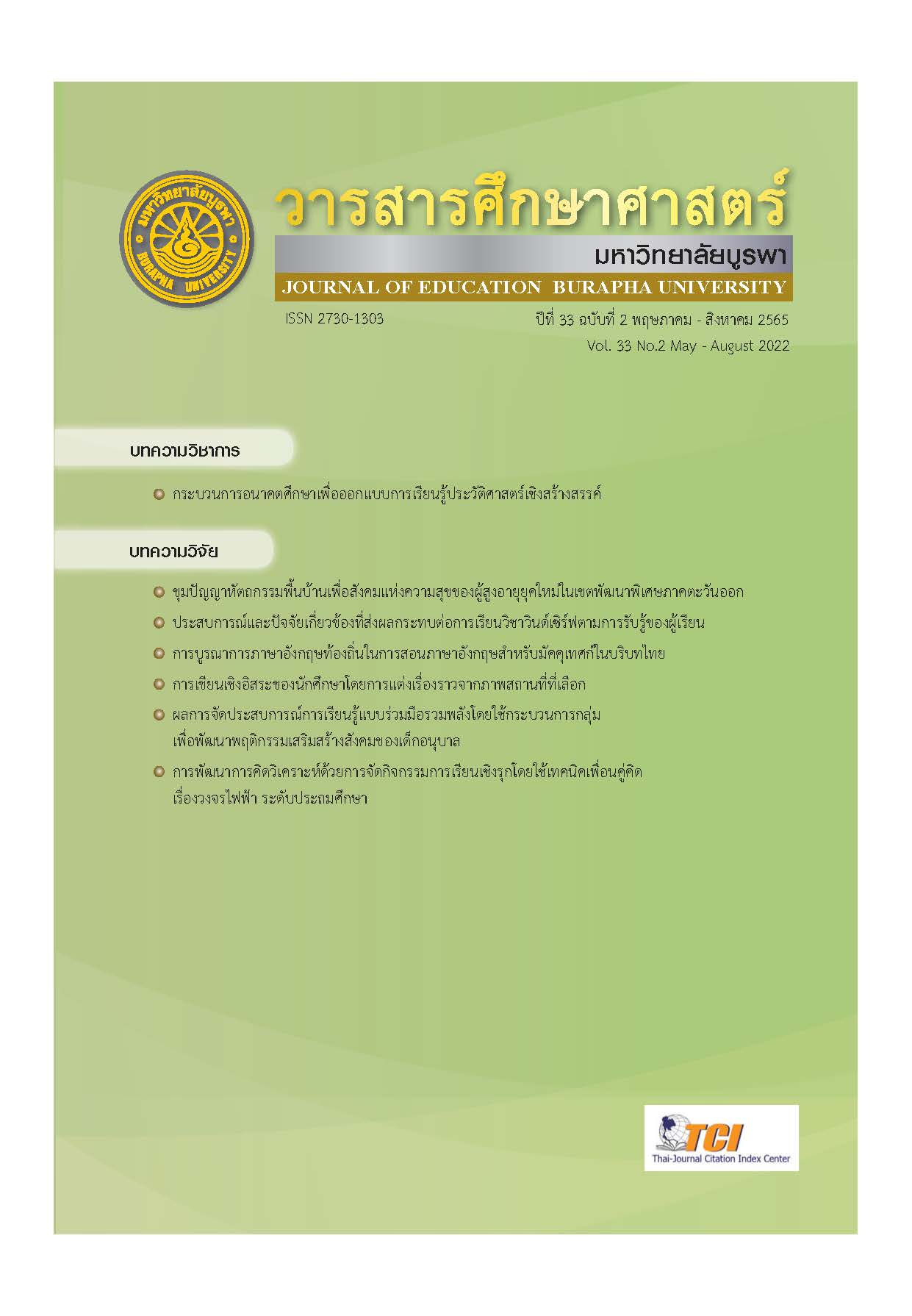การเขียนเชิงอิสระของนักศึกษาโดยการแต่งเรื่องราวจากภาพสถานที่ที่เลือก
คำสำคัญ:
การเขียนเชิงอิสระ, ปัญหาของการเขียนเชิงอิสระ, กระบวนการการเขียนเชิงอิสระ, การประเมินกระบวนการการเขียนเชิงอิสระ, การเขียนเรื่องราวบทคัดย่อ
บทความนี้มีวัตถุประสงค์เพื่อแบ่งปันประสบการณ์การสอนการเขียนเชิงอิสระและเป็นการแนะนำเพื่อเป็นแนวทางแก่อาจารย์สอนภาษาอังกฤษในการเขียนเชิงอิสระแก่นักศึกษาระดับปริญญาตรี จากประสบการณ์การสอนการเขียนเชิงอิสระภาษาอังกฤษของผู้เขียน ผู้เขียนได้เห็นว่านักศึกษาส่วนมากไม่สามารถเขียนเชิงอิสระได้แม้ว่าพวกเขาจะมีความรู้ไวยากรณ์ภาษาอังกฤษ การที่ไม่สามารถเขียนได้มาจากหลายปัจจัยเช่นนักศึกษาไม่เพียงต้องรู้ว่าเขียนอะไรแต่ต้องรู้ว่าเขียนอย่างไรอีกด้วย ปัญหานี้ไม่เพียงแต่หมายถึงนักศึกษารู้ว่าจะเขียนอะไรแต่ยังหมายถึงเขียนอย่างไรอีกด้วย ดังนั้นเพื่อช่วยให้นักศึกษาสามารถเขียนการเขียนเชิงอิสระได้อาจารย์สอนภาษาอังกฤษควรสอนนักศึกษาถึงกระบวนการการเขียนซึ่งรวมถึง การวางแผน, การสร้างภาพประกอบ, การเชื่อมความเกี่ยวข้องถึงบริบทสังคม, การประมวลความคิด เป็นต้น บทความนี้ผู้เขียนจึงเสนอแนะวิธีการสอนการเขียนเชิงอิสระต่ออาจารย์สอนภาษาอังกฤษเพื่อนำไปประยุกต์ในชั้นเรียนภาษาของพวกเขา ในการสอนผู้เขียนมอบหมายให้นักศึกษาเลือกสถานการณ์จริงหรือภาพฉากจริงโดยการนั่ง ณ สถานที่หนึ่ง และ ณ เวลาหนึ่งและเขียนเรื่องราวของเขาเองที่เกี่ยวกับสถานที่นั้น
เอกสารอ้างอิง
Angelelli, C. (2000). Interpretation as a Communicative Event: A Look through Hymes’ Lenses Meta. Journal des Vol. 45 No. 4. December 2000. Traducteurs. Translators’ Journal Les Presses de I’Universite de Montreal. P. 569-695.
Chimombo, M. (1987). “Towards reality in the writing class”, ELT journal, Vol. 41, No.3, July, p. 204.
Dees, R. (2003). Writing the Modern Research Paper. New York: Longman. United States of America.
Earnshaw, S. (2007). The Handbook of Creative Writing. Edinburgh University Press.
Grabe, W. & Kaplan, B., R. (1996). Theory and Practice of Writing: An Applied Linguistic Perspective. Teaching writing at beginning levels. Longman. New York.
Hedge, T. (2000). Teaching and Learning in the Language Classroom. Oxford. Oxford University Press.
Indrisamo, R. and Squire, J. R. (2000). Perspectives on Writing, Research, Theory and Practice, Library of Congress Cataloging in Publication Data, Canada. 11.
Kroll, B. (1991). Second Language Writing, Research Insights for the Classroom, Cambridge University Press, Cambridge. 25, 127, 161.
Leki, I. (1998). Academic Writing, Exploring Process and Strategies, Cambridge. Cambridge University Press.
Li, L. Y. (2007). Exploring the Use of Focused Freewriting in Developing Academic Writing. Journal of University Teaching & Learning Practice. Vol. 4 Issue 1. University of Camberra. 46-60.
Maurice, K. (1988). “Laugh While Learning Another Language Techniques That Are Functional and Funny”, English Teaching Forum, Vol. 26, No. 2. 20-24.
McWhorter, K., T. (1988). Study and Thinking Skills in College. Boston: Scott, Foresman and Company.
Mlazgar, B. (2004). Saskatchewan Writers LIVES past and Present. Canadian Plains Research Center. Canana. University of Regina.
Palmer, B. C., Hafner, M. L., and Sharp, M. F. (1994). Developing Cultural Literacy Through the Writing Process, A Division of Paramount Publishing, Boston. USA.
Pawiliczak, J. (2015). Creative Writing as a Best Way to Improve Writing Skills of Students. Simo-US English Teaching, May 2015, Vol. 12. No 5. 347-352.
Pupipat, A. (2004). Using Jokes to Promote Cultural Awareness, Ubon Ratchathani University, Thailand. 87-88.
Ransdell, D., R. (1993). Creative writing is Creek to me: the continuing education of a language teacher. ELT Journal Vol. 47/1 January 1993. Oxford. Oxford University Press.
Schweiker, M., Zogby, C., Carey, T., P., Kozup, M., J., Plempel, L. & Martine, A., S. (2002). Writing Assessment Released Writing Prompts. The Pennsylvania System of School Assessment, Pennsylvania Department of Education Division of Evaluation and Reports.
Tribble, C. (1996). Writing. Oxford. Oxford University Press.
Tomlinson, B. (2013). Developing Materials For Language Teaching. Bloomsbury Publishing. New York. 168-173.
Weigle, S., C. (2002). Assessing Writing: Scoring procedures for writing assessment. Cambridge: Cambridge University Press, 33-35, 109-139.
Woolfolk, A. E. (1993). Educational Psychology, Allyn and Bacon, Boston. USA.
ดาวน์โหลด
เผยแพร่แล้ว
รูปแบบการอ้างอิง
ฉบับ
ประเภทบทความ
สัญญาอนุญาต

อนุญาตภายใต้เงื่อนไข Creative Commons Attribution-NonCommercial-NoDerivatives 4.0 International License.
ลิขสิทธิ์ของบทความที่ปรากฏในวารสารศึกษาศาสตร์ มหาวิทยาลัยบูรพา เป็นของวารสารศึกษาศาสตร์ มหาวิทยาลัยบูรพา ทั้งนี้บทความทุกเรื่องผ่านการตรวจสอบความถูกต้องทางวิชาการจากผู้ทรงคุณวุฒิ ข้อความและข้อมูลของบทความในวารสารฯ เป็นแนวคิดของผู้แต่ง มิใช่เป็นความคิดเห็นของกองบรรณาธิการ และมิใช่ความรับผิดชอบของคณะศึกษาศาสตร์ มหาวิทยาลัยบูรพา ไม่สงวนลิขสิทธิ์การนำไปใช้ประโยชน์ทางวิชาการแต่ต้องอ้างอิงแสดงแหล่งที่มาและอยู่ในขอบเขตของกฎหมายลิขสิทธิ์



